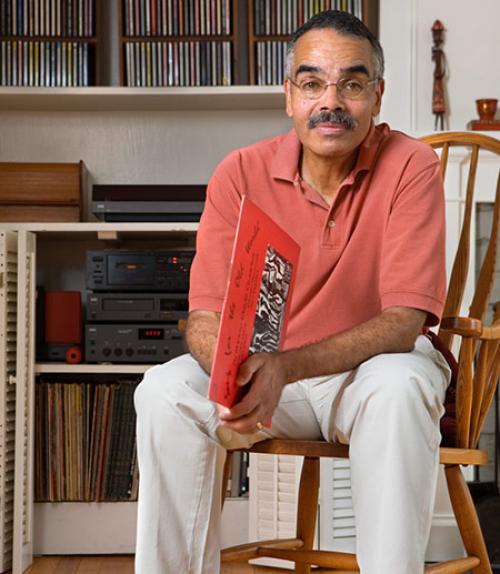Kenneth A. McClane ’73, quoting Montaigne’s essay on friendship, spoke of how “in a child’s self-involvement, he or she remembers whether someone was generous, kind or mean-spirited” in his Phi Beta Kappa lecture Oct. 28, and recounted his family’s role in the Civil Rights movement and how Duke Ellington often let him sit on his knee while playing the piano.
McClane, the W.E.B. DuBois Professor Emeritus of Literature, taught English and creative writing at Cornell for 37 years. He reflected on some of his formative experiences in a talk, “Friendship: A Narrative about Race, Family, War and Fishing.”
McClane described his life growing up in Harlem during the 1950s and ’60s, where his family was prominent in the Civil Rights movement, with a family friend named Bill Preston – a white, twice-divorced WWII veteran who taught him about the meaning of true friendship and humility.
“Though we lived in Harlem, my family was still ‘Boston fettered,’ manacled by that New England Stoicism that could burn witches or make one appear, in my father’s terminology, as if one had an ‘eternal stick up their ass.’ My parents had moved from Boston to New York City after both of them had been educated, two college graduates, one a physician, the other a pharmacist, living in Harlem, under the tutelage of Congressman Adam Clayton Powell.”
Preston was the best friend of McClane’s father, a physician who insisted on practicing in Harlem, he said, again quoting Montaigne,“In the friendship I speak of, they mix and work themselves into one piece which is so universal a mixture that there is no more signs of the seed by which they were first formed.”
Said McClane, “During the tempestuous years of the Civil Rights struggle Bill first met my parents at some funky fundraiser, and they quickly became inseparable. It was one of those 1960 soirees – where politics, intoxicants, and narcissism, preened together, like Little Richard. When the three of them couldn’t swallow the over-the top agitprop performance by an ‘artist,” who had red-white-and blue snot coming out of his nose, and this is not hyperbole, the three of them, walked over to the Village Vanguard and listened to something truly revolutionary: Miles Davis and Bill Evans.”
Throughout his life, McClane said, Preston stood as a constant presence, an emotional “midwife” to the family.
“It was he [Preston] who told my father that I would become a poet,” he noted. Preston was there when McClane’s brother died from alcoholism and through the decline of his mother and father from Alzheimer’s disease, he said; but the most important lesson that Preston taught him is that “only love can manage the miracle of making life bearable.”
Summing up Preston, McClane said, “In his great affirmations and his great insufficiencies, Bill was life Writ large. And as he could never sever himself from that dead child in Germany, or the unregenerate killing of the SS officer, or the hope of a world where color didn’t nullify, neither could he, wounded traveler that he was, ever fail to acknowledge his shortcomings. Bill died a few months after my father entered the nursing home. When I told my father of Bill’s death, he just stated, ‘friend, great friend.’”
McClane also spoke about growing up in during a time where “Americans like to talk about the importance of freedom of speech and telling the truth, but they also like lynching people.”
Seeing the marks on freedom fighters, left by cattle prods used by segregationists, showed McClane that people were willing to fight for what they believed in.
“I would memorialize that,” he said.
McClane was introduced by Daniel Schwarz, professor of English, who described McClane as a “towering presence at Cornell” and “a model of how to balance citizenship at Cornell with teaching excellence and a career as a writer.”
In 2004, McClane was named a Stephen H. Weiss Presidential Fellow, Cornell’s highest teaching honor. He is the author of seven poetry collections and has published two volumes of personal essays.
This story also appeared in the Cornell Chronicle.
Breonna Freeman ’19 is a writer intern for the Cornell Chronicle.




